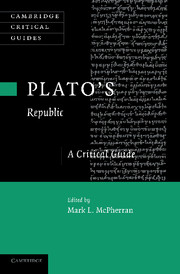Book contents
- Frontmatter
- Contents
- Acknowledgments
- List of contributors
- List of abbreviations
- Introduction
- 1 Socrates in the Republic
- 2 Platonic ring-composition and Republic 10
- 3 The Atlantis story: the Republic and the Timaeus
- 4 Ethics and politics in Socrates' defense of justice
- 5 Return to the cave
- 6 Degenerate regimes in Plato's Republic
- 7 Virtue, luck, and choice at the end of the Republic
- 8 Plato's divided soul
- 9 The meaning of “saphēneia” in Plato's Divided Line
- 10 Plato's philosophical method in the Republic: the Divided Line (510b–511d)
- 11 Blindness and reorientation: education and the acquisition of knowledge in the Republic
- 12 Music all pow'rful
- Bibliography
- Index of passages
- Index of names and subjects
1 - Socrates in the Republic
Published online by Cambridge University Press: 04 February 2011
- Frontmatter
- Contents
- Acknowledgments
- List of contributors
- List of abbreviations
- Introduction
- 1 Socrates in the Republic
- 2 Platonic ring-composition and Republic 10
- 3 The Atlantis story: the Republic and the Timaeus
- 4 Ethics and politics in Socrates' defense of justice
- 5 Return to the cave
- 6 Degenerate regimes in Plato's Republic
- 7 Virtue, luck, and choice at the end of the Republic
- 8 Plato's divided soul
- 9 The meaning of “saphēneia” in Plato's Divided Line
- 10 Plato's philosophical method in the Republic: the Divided Line (510b–511d)
- 11 Blindness and reorientation: education and the acquisition of knowledge in the Republic
- 12 Music all pow'rful
- Bibliography
- Index of passages
- Index of names and subjects
Summary
Not only is Socrates one of the fictional characters in the Republic, he is also its fictional voice. The character Socrates speaks every word of the work, retelling a discussion that developed at the house of Cephalus on the preceding day; and it is a discussion in which Socrates himself played a leading role. To the modern narratologist, Socrates is the Republic's “internal narrator.” External narrators, by contrast, are not themselves characters in the stories they tell, even if, on occasion, they refer to themselves in the first person. From their vantage point above the fray, external narrators are free to record the private thoughts and feelings of their characters. Internal narrators, at least those who present themselves realistically, do not enjoy the same privilege. For them, a distinction obtains between their private thoughts, plans, and reactions and the thoughts, plans, and reactions of the other characters in the story. An internal narrator may, if he so wishes, describe his private thoughts directly; the thoughts of others he can (or should) only surmise. If he does decide to make the audience for his story – the “narratee” – privy to his thoughts, he can achieve with that audience a degree and a range of intimacy, or its appearance, that is generally unavailable to the external narrator.
Socrates in the Republic avails himself of this opportunity for intimacy at several points.
Keywords
- Type
- Chapter
- Information
- Plato's 'Republic'A Critical Guide, pp. 11 - 31Publisher: Cambridge University PressPrint publication year: 2010
- 1
- Cited by



